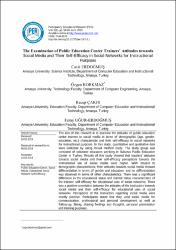The examination of public education center trainers’ attitudes towards social media and their self-efficacy in social networks for instructional purposes

View/
xmlui.dri2xhtml.METS-1.0.item-rights
info:eu-repo/semantics/openAccessDate
2019Metadata
Show full item recordAbstract
The aim of this research is to examine the attitudes of public education center trainers to social media in terms of demographic (age, gender, education, etc.) characteristic and their self-efficacy in social networks for instructional purposes. In this study, quantitative and qualitative data were collected by using mixed method study. The study group was consisted of volunteer educators working in Suluova Public Education Center in Turkey. Results of this study showed that teachers' attitudes towards social media and their self-efficacy perceptions towards the instructional use of social media were higher. With respect to demographic characteristics, their attitudes towards social media showed differentiation in terms of gender and education, and no differentiation was observed in terms of other characteristics. There was a significant difference in the educational status and marital status characteristics of the trainers' self-efficacy for educational uses of social networks. There was a positive correlation between the attitudes of the instructors towards social media and their self-efficacy for educational uses of social networks. Perceptions of the instructors regarding social media were mostly positive. Participants stated that they used social media for communication, professional and personal development as well as follow-up, liking, sharing feelings and thoughts, personal presentation and training purposes. © 2019, Ozgen Korkmaz. All rights reserved.

















